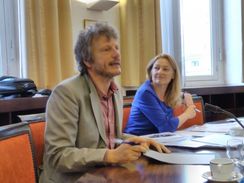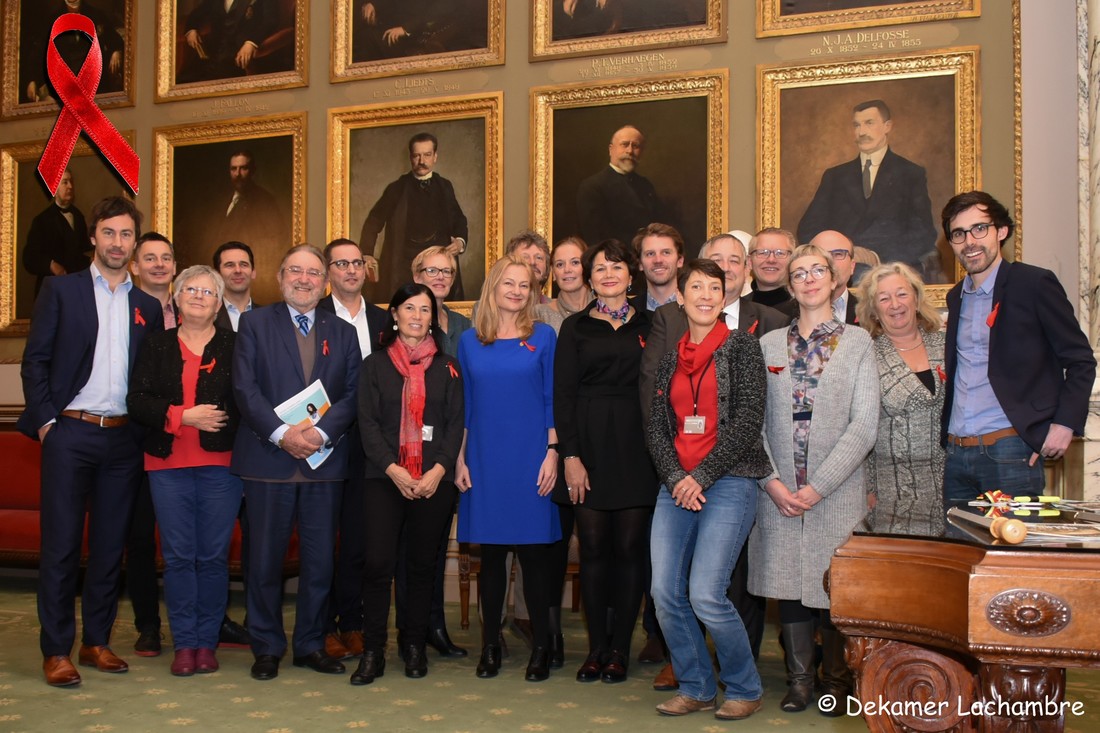“We can control the epidemic by 2030, the deadline of the Global Agenda for Sustainable Development”. These are not our words, but those of Inge Tack, Senior Adviser for UNAIDS. Inge Tack informed the Belgian parliament about the global trends in the uptake of HIV.
 Marc Biot (MSF) and Inge Tack (UNAIDS) in Belgium's federal parliament.
Marc Biot (MSF) and Inge Tack (UNAIDS) in Belgium's federal parliament. “Compared to the past, the prices for medicines have gone down, treatment is less complicated and started much earlier. Consequently, people living with HIV acquire an undetectable viral load much sooner, which means they can no longer pass on the virus.”
Most progress has been made in Southern Africa, exactly in those societies that were hit the hardest. The keys to success are a strong civil society, a favourable political climate, governments who commit to both prevention and treatment, as well as continued international support.
As many countries cannot do it on their own, international financial solidarity remains indispensable. Progress in West- and Central-Africa, a region with many Belgian partner countries, is slow. In these low income countries and fragile states, governments cannot carry the financial and logistical costs of treatment and prevention.
Médécins Sans Frontières (MSF) is an international player with ample experience in the uptake of HIV. The NGO ensures access to treatment for about a quarter of a million people and organises prevention campaigns that target both men and women. Marc Biot, doctor for MFS, explained the many barriers to treatment to the parliamentarians. Stigma, the cost of care and the lack of transport undermine people’s access. Treatments may not be interrupted either, so as not to run the risk of developing resistance to the drugs and acquiring AIDS. A lack of medicine, weak logistics and inaccessible roads can thus have deadly consequences.
Both experts underline the importance of a multi-sectoral approach to HIV and AIDS. They elaborated about the relationship between sexual violence and HIV and pointed out the multiple vulnerabilities of specific groups such as young people, men who have sex with men, sex workers and migrants. They closed the meeting with a call for continued investments in the uptake of HIV. A multi-sectoral approach means investments in healthcare need to go hand in hand with investments in infrastructure, education, good governance and the empowerment of civil society.
Most progress has been made in Southern Africa, exactly in those societies that were hit the hardest. The keys to success are a strong civil society, a favourable political climate, governments who commit to both prevention and treatment, as well as continued international support.
As many countries cannot do it on their own, international financial solidarity remains indispensable. Progress in West- and Central-Africa, a region with many Belgian partner countries, is slow. In these low income countries and fragile states, governments cannot carry the financial and logistical costs of treatment and prevention.
Médécins Sans Frontières (MSF) is an international player with ample experience in the uptake of HIV. The NGO ensures access to treatment for about a quarter of a million people and organises prevention campaigns that target both men and women. Marc Biot, doctor for MFS, explained the many barriers to treatment to the parliamentarians. Stigma, the cost of care and the lack of transport undermine people’s access. Treatments may not be interrupted either, so as not to run the risk of developing resistance to the drugs and acquiring AIDS. A lack of medicine, weak logistics and inaccessible roads can thus have deadly consequences.
Both experts underline the importance of a multi-sectoral approach to HIV and AIDS. They elaborated about the relationship between sexual violence and HIV and pointed out the multiple vulnerabilities of specific groups such as young people, men who have sex with men, sex workers and migrants. They closed the meeting with a call for continued investments in the uptake of HIV. A multi-sectoral approach means investments in healthcare need to go hand in hand with investments in infrastructure, education, good governance and the empowerment of civil society.


 RSS Feed
RSS Feed